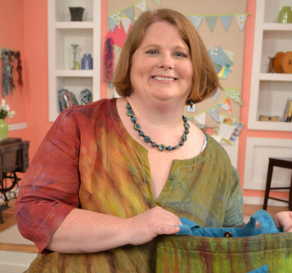 Candace Glendening: A molecular biologist by training, I love teaching science to non-science majors. Bizarre as it sounds, I enjoy using the lab to explain science to people who are afraid of it! I've been teaching at Redlands for 12 years now. Before that I worked in a Pre-Harvest Food Safety laboratory at The Ohio State University, studying the genetics of anti-microbial resistance. I've also taught science at Morehead State University in Morehead, KY, and researched tumor suppressor genes at the Dana Farber Cancer Institute in Boston, MA.
Candace Glendening: A molecular biologist by training, I love teaching science to non-science majors. Bizarre as it sounds, I enjoy using the lab to explain science to people who are afraid of it! I've been teaching at Redlands for 12 years now. Before that I worked in a Pre-Harvest Food Safety laboratory at The Ohio State University, studying the genetics of anti-microbial resistance. I've also taught science at Morehead State University in Morehead, KY, and researched tumor suppressor genes at the Dana Farber Cancer Institute in Boston, MA.
Brian Gadd received his BA in Biochemistry from Colorado College in 2004 and

his PhD in Cell, Molecular and Developmental Biology from the University of California, Riverside in 2012. He has been teaching as an adjunct professor with the Biology department since the Spring of 2013 and has returned full time for the 2015-2016 academic year as a Visiting Lecturer. Dr. Gadd teaches both M1 and upper division courses including Issues and Techniques in Genetic Engineering, Cancer Biology, and the Principles of Biology.
Project Summary:
The three-dimensional properties of biological systems are often the key to understanding how they function. However, the molecules involved are too small to be visualized via microscopy yet too big to be effectively modeled using molecule modeling kits commonly found in chemistry. Thus, students often struggle to grasp the spatial organization at the macromolecular scale. This project will explore the use of 3D printing, coupled with 3D visualization by utilizing student smartphones or tablets, to illustrate key biological molecules and concepts for both majors and non-majors alike. The low cost, flexibility, and pedagogical value that 3D printing allows is one reason this bourgeoning technology is rapidly making its way into STEM education. In addition, many tools are making incorporation into the classroom setting and lessons simpler. Utilizing 3D printing has potential in the biology classroom beyond the molecular molecule.
This is a pilot project to demonstrate the feasibility and effectiveness of digital and physical 3D models to enhancing student understanding of key biological concepts. Toward this aim, we will use several 3D-printed models for demonstrations, as well as design and incorporate several hands-on exercises using 3D-printed and digital models in the classroom.

 Candace Glendening: A molecular biologist by training, I love teaching science to non-science majors. Bizarre as it sounds, I enjoy using the lab to explain science to people who are afraid of it! I've been teaching at Redlands for 12 years now. Before that I worked in a Pre-Harvest Food Safety laboratory at The Ohio State University, studying the genetics of anti-microbial resistance. I've also taught science at Morehead State University in Morehead, KY, and researched tumor suppressor genes at the Dana Farber Cancer Institute in Boston, MA.
Candace Glendening: A molecular biologist by training, I love teaching science to non-science majors. Bizarre as it sounds, I enjoy using the lab to explain science to people who are afraid of it! I've been teaching at Redlands for 12 years now. Before that I worked in a Pre-Harvest Food Safety laboratory at The Ohio State University, studying the genetics of anti-microbial resistance. I've also taught science at Morehead State University in Morehead, KY, and researched tumor suppressor genes at the Dana Farber Cancer Institute in Boston, MA. his PhD in Cell, Molecular and Developmental Biology from the University of California, Riverside in 2012. He has been teaching as an adjunct professor with the Biology department since the Spring of 2013 and has returned full time for the 2015-2016 academic year as a Visiting Lecturer. Dr. Gadd teaches both M1 and upper division courses including Issues and Techniques in Genetic Engineering, Cancer Biology, and the Principles of Biology.
his PhD in Cell, Molecular and Developmental Biology from the University of California, Riverside in 2012. He has been teaching as an adjunct professor with the Biology department since the Spring of 2013 and has returned full time for the 2015-2016 academic year as a Visiting Lecturer. Dr. Gadd teaches both M1 and upper division courses including Issues and Techniques in Genetic Engineering, Cancer Biology, and the Principles of Biology.